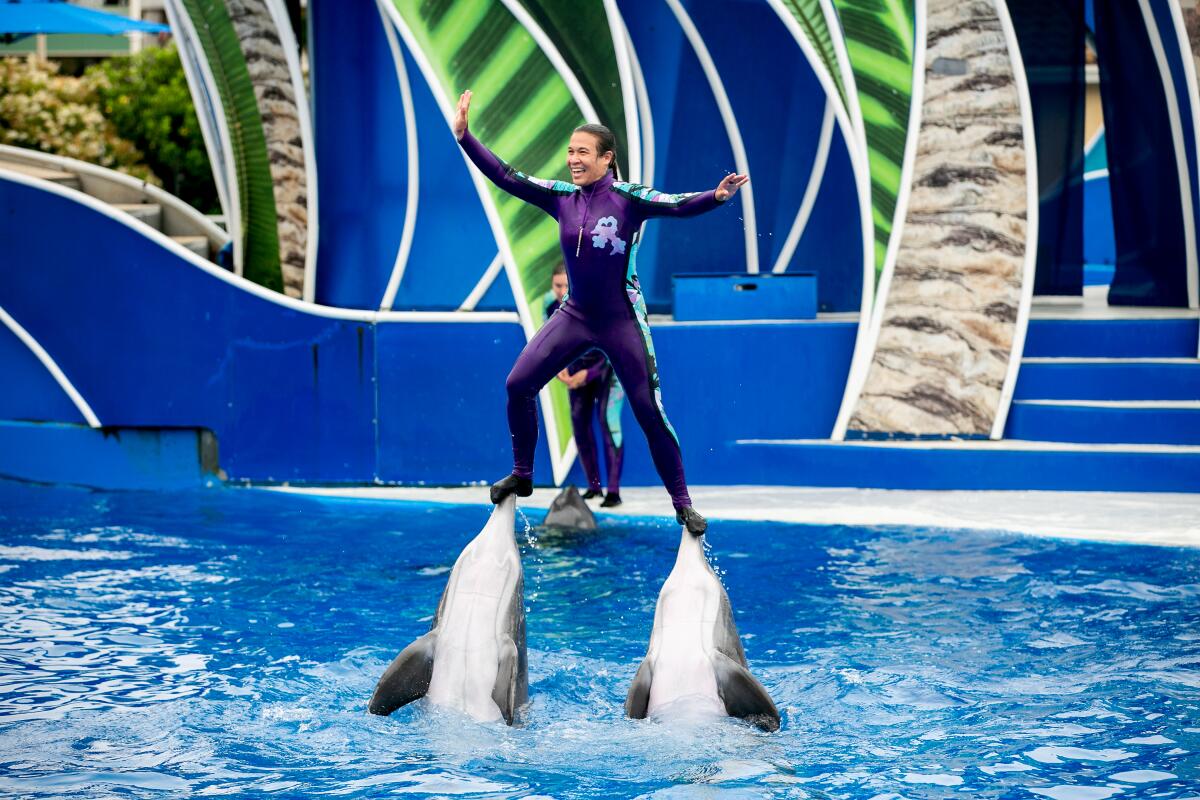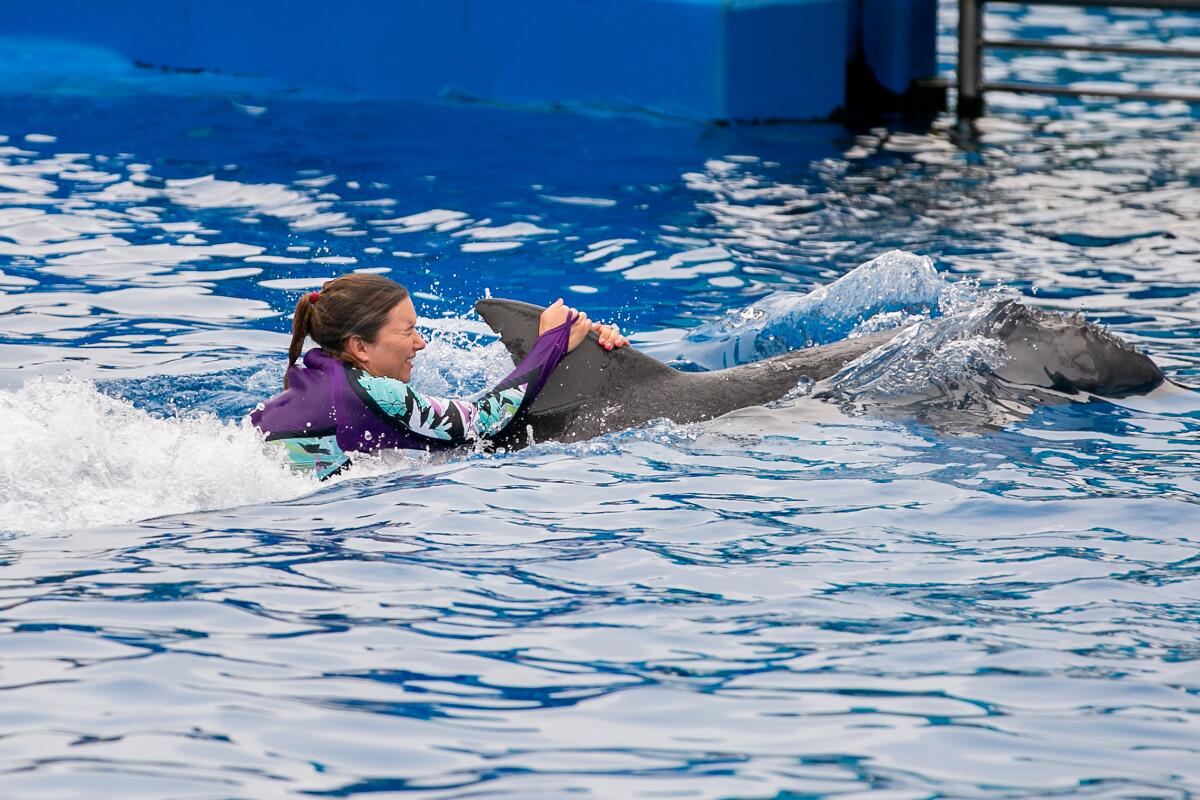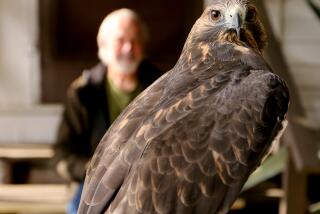PETA claims victory after SeaWorld says no to trainers riding atop dolphins

- Share via
SAN DIEGO — SeaWorld Entertainment says it is ending the longstanding practice of trainers riding astride dolphins in marine park shows, a move that comes nearly a year after animal rights activists began pressuring the company to ban such “circus-style” behaviors.
The decision to move away from such showy theatrics in the dolphin shows was disclosed in a letter sent earlier this month by a SeaWorld attorney to the Securities and Exchange Commission. The letter was addressing a shareholder proposal made last December by People for the Ethical Treatment of Animals, which asked that SeaWorld prohibit trainers from riding on dolphins’ backs and standing on their faces.
As of last December, PETA held 163 shares of SeaWorld stock and has owned at least $2,000 worth of common stock for some time.
In the letter, signed by attorney Niyati Roy on behalf of Orlando-based SeaWorld Entertainment, the company states that it “no longer demonstrates ‘surfing’ (on dolphins) at any of its locations, and plans to phase out the demonstration of standing on rostrums within the next few months, despite its belief that neither of these behaviors are harmful to the animals in any way.” It goes on to emphasize that only one of SeaWorld’s 12 parks — SeaWorld San Diego — continues to allow trainers to stand on the bottlenose dolphins’ rostrums.

“Further, of the approximately 140 dolphins — which make up a small number of the thousands of animals (comprising) over 1,300 species — in the Company’s care, fewer than ten currently participate in the presentation in which trainers stand on the animals’ rostrums,” wrote Roy of the New York law firm Simpson Thacher & Bartlett, which is representing SeaWorld.
David Koontz, spokesman for the San Diego park, said Thursday that the act of trainers standing astride the dolphins was phased out late last year.
In response to SeaWorld correspondence with the SEC stating the company’s intention to no longer allow trainers to ride atop dolphins, PETA has decided to withdraw its shareholder proposal. In turn, SeaWorld’s attorney on Thursday withdrew its letter to the SEC.
“I don’t think it’s coincidental that they decided to move away from this now,” said John Di Leonardo, senior manager of PETA’s animals and entertainment campaign. “In 2020, when the public is increasingly seeing that animals are not being exploited in circuses anymore, it would be very unwise for them to move backward. It’s obvious PETA’s pressure was responsible for them to stop the surfing and standing on the dolphins’ faces.”
In a statement released Thursday, SeaWorld did not credit pressure from animal activists for its change in direction with its Dolphin Days shows.
“SeaWorld is continually evolving its animal presentations to create the best experience for both guests and our animals,” the company said. “As an accredited zoological facility, our leadership solely determines the content and format of our presentations and is not influenced in any way by the actions of ill-informed activists, who are seemingly more interested in their profile and fundraising than they are the welfare of animals.”
PETA formally launched its dolphin campaign last June when it held a news conference to trumpet a study it helped produced, based on observations made in November 2018. It concluded that the “well-being of captive dolphins at the parks is severely compromised by the conditions in which they’re forced to live.” The report raised a number of concerns, including potential injury from circus-like tricks in which a trainer balances on the dolphins’ rostrums, or snouts.
At the time, SeaWorld quickly rebutted the claims, and its vice president of animal health and welfare for the SeaWorld and Busch Gardens parks, Hendrik Nollens, stressed that none of the parks had ever diagnosed an injury to a dolphin related to any of the trainer behaviors called out by PETA. Nollens at the time noted that SeaWorld had been gradually moving away from theatrical animal productions, as in the case of the revamped killer whale presentations, but he said then that he knew of no such change in the works for the Dolphin Days shows.
Unlike the in-water interaction that the SeaWorld trainers have regularly had with the dolphins during the park performances, the orca shows long ago banished trainers from cavorting with the killer whales in the water.
SeaWorld for years faced a backlash from the public after the 2013 release of the anti-captivity documentary “Blackfish,” which was critical of the theme park company for how it treated its killer whales. More recently, attendance has been on the rise, and the company has been introducing a steady stream of crowd-pleasing thrill rides, including roller coasters at the San Diego park. Currently under construction is Emperor, which SeaWorld boasts will be the fastest and tallest dive coaster in California.
No doubt the strong feelings engendered by “Blackfish” have gradually faded, said George Belch, a professor of marketing at San Diego State University, but it still makes sense for SeaWorld to quell the latest controversy by phasing out the dolphin exhibits that have fueled PETA’s ire.
“They’ve been under a lot of pressure, and from their perspective, why would they continue this fight?” said Belch, an associate dean at SDSU. “It’s kind of a way of saying I’m not going to acknowledge any guilt, but it’s time to move on and stop the controversial practice; otherwise it’s going to linger.”
More to Read
Inside the business of entertainment
The Wide Shot brings you news, analysis and insights on everything from streaming wars to production — and what it all means for the future.
You may occasionally receive promotional content from the Los Angeles Times.











